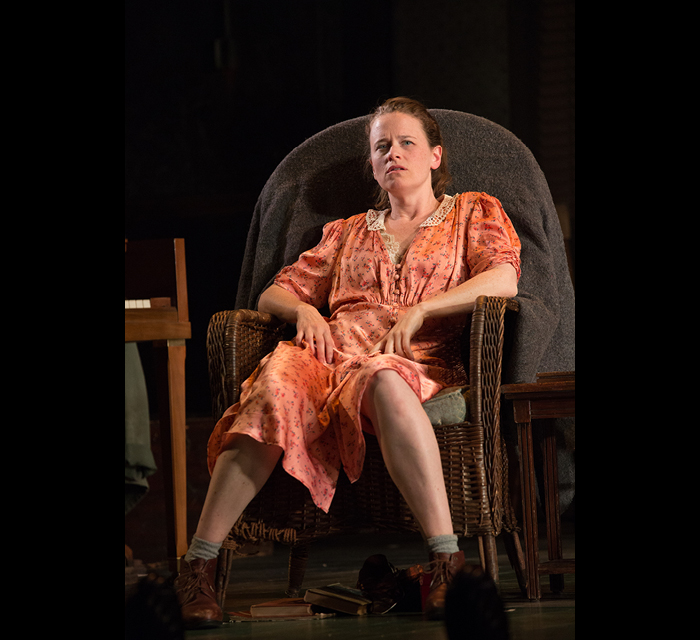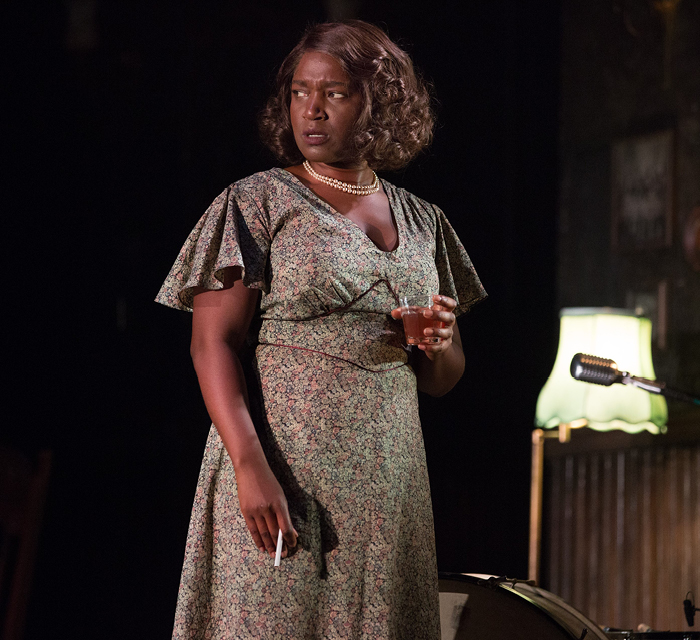Girl From The North Country at the Gielgud Theatre: The huge sprawling cast makes for mangled and messy storytelling

In demonstration of the clichéd American grit, we often see the whole cast dancing arm-in-arm, singing, drinking and laughing in pure defiance.
After premiering at The Old Vic two years ago, Girl from the North Country returns to the stage with a fresh cast, this time bringing the bleakness of the American Great Depression to the opulence of the Gielgud Theatre. Written and directed by
Costumes form a sea of dull browns and dirty beiges, and of the characters that don’t look battered or greasy, their apparel of quiet dignity and determined perseverance is stressing at the seams. Amongst this unhappiness, the musical score made up of Bob Dylan’s songs from across his musical career stitches together multiple stories of destitution and the disenfranchised American working class.
The story is narrated by Dr Walker (Ferdy Roberts), who is the physician tending to Elizabeth Laine (Katie Brayben) – a woman who suffers from manic form of dementia which can often lead to uninhibited outburst. The play opens in a rundown guesthouse owned by Nick Laine (Donald Sage Mackay), her husband. Of course, being the midst the Great Depression, it is unsurprising that Nick is in the desperate position to save both his guesthouse and his family. Together, they have two children: budding writer Gene (Colin Bates), who is in his early twenties, and their adopted daughter, Marianne (Gloria Obianyo), who was abandoned in the guesthouse as a baby, is nineteen and five months pregnant.

The father of Marianne’s unborn child is a closely guarded secret and her father Nick plans for her to marry a much older man, Mr Perry (Sidney Kean) as a way for her to survive as both a young and black woman with a child. Gene has ambitions of becoming a writer, but Nick is also desperate for him to earn money. His low financial status becomes a reality to him once his lover, Katherine (Gemma Sutton), informs him that she is to marry a wealthy man. Meanwhile, Nick is having an affair with one of the guests in his house, Mrs. Neilsen (Rachel John), who is a widow waiting for her late husband’s will to clear probate. There are numerous other characters, all of which has similar stories of survival and persistence. These include a reverend (Finbar Lynch) and a boxer looking for work (Shaq Taylor).
For black people, America had never been in a state of prosperity to begin with, and therefore The Great Depression is really a white narrative. Oftentimes, this period of history has been retold through the eyes of white America and this production does not deviate much from this; the story is told through a white narrator and the play revolves around a white American’s guesthouse, in which African-American characters are invited guests. However, there is mention of lynchings and even a scene in which the power dynamics between whites and blacks is evident; during one of his drunken outbursts, Gene refers to boxer Joe Scott as “boy”, whilst Joe addresses white men as “sir”.
This small domestic microcosm of Nick’s guesthouse stands against an industrial backdrop of telephone lines and a railway. The destitute theme of industry shows mercantilism conquering nature and tradition.
In demonstration of the clichéd American grit, we often see the whole cast dancing arm-in-arm, singing, drinking and laughing in pure defiance.

The musical score has Dylan songs that are well-known as well as those that are a little less familiar. Even if you’re not a Bob Dylan fan, the unique takes on each of his songs will certainly impress you! Rachel John’s performance is breath-taking; her voice transcends the stage and you would be quite happy to be attending her concert instead. And though I’d say Katie Brayben’s performance lacks subtlety in her depiction of manic dementia, which would have given greater authenticity to her performance, her raw take on ‘Like a Rolling Stone’ is a sight to behold. Elizabeth Laine is the epitome of the liberated id, the most truthful and rawest of characters and this is perfectly captured in this wild performance, in which there is so much energy that her one of her hair clips unintentionally breaks free and pings off her head mid-performance.
The huge sprawling cast, however, makes for mangled and messy storytelling. The huge number of storylines leaves you unable to really invest your interest or emotion in anyone which makes the events unfold in an emotionless vacuum. The ending is wrapped by the narrator, who in all honesty is not in any way charming or particularly useful in driving the plot. One of the stories is of unfulfilled young love between Gene and Katherine; Gene is of a working-class background and therefore undesirable husband material for the middle-class, sophisticatedly dressed Katherine. This love story, however, turns up out of the blue, is barely revisited and bears no resemblance to the exhaustive frustration of The Notebook. There are far too may questions left unanswered and the attempt of using the narrator to tie up all the loose ends seems somewhat shoddy.
Girl From the North Country will be on at the Gielgud Theatre until the 2nd February 2020. Get your tickets here.
Photo Credit: Cylla Von Tiedemann

